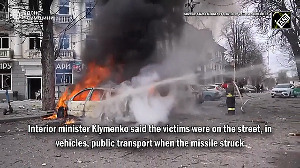On October 24, when Prime Minister Mammohan Singh embarks on a significant three-nation Asian tour covering Japan, Malaysia and Vietnam, it will be more with a sense of hope than satisfaction.
The enthusiasm of the Japanese leg of the visit would be dampened a bit following the lack of success that India could derive from its talks with Japan on the nuclear supplies pact.
Foreign Secretary Nirupama Rao said on Friday that negotiations for a civil nuclear cooperation accord are continuing with Japan, but the talks will not conclude by the time Manmohan Singh is in Tokyo.
"We will not be signing an agreement because we need to have a few more rounds of discussions," she said.
Meanwhile, a very senior source in the Prime Minister's Office said that the likelihood of the two Asian economic powerhouse signing civil nuclear deal were very bleak given Japan's stand on the issue.
India and Japan had earlier this month had a second round of talks on a civil nuclear agreement with both sides stating their positions and deciding to hold another round.
The dates for the next round would be fixed through diplomatic channels.
Japan insists that India must commit to not conducting any nuclear tests and that should reflect in the proposed agreement.
India, on the other hand, maintains that its unilateral moratorium was unambiguously stated when its negotiations with other nations led to its inclusion in global civil nuclear trade.
Japan also wanted India to commit to signing the Comprehensive Test Ban Treaty.
However, the Indian prime minister and Japanese Prime Minister Naoto Kan are likely to announce the conclusion of a landmark Comprehensive Economic Cooperation Agreement in Tokyo on October 25.
'The agreement signifies the economic alignment of two of the largest economies in Asia and would lead to a marked increase in our business and economic ties,' Rao said, describing the CEPA as 'a win-win proposition' for both countries, said Rao.
"Our relations with Japan stand transformed. The Indian economy is getting increasingly integrated with those of its East Asian partners. The prime minister's three-nation Asian tour is organically defined by this process," she added.
The prime minister will first visit Japan for his Annual Summit with Japanese Prime Minister Naoto Kan. He will arrive in Tokyo on the evening of October 24.
On Monday October 25, the prime minister and his wife, Gursharan Kaur, will have an audience with their Majesties, The Emperor and Empress of Japan.
The same evening, the prime minister will hold extensive discussions with Prime Minister Naoto Kan both in restricted and delegation level sessions, on bilateral, regional and global issues.
Prime Ministers Singh and Kan will also discuss Japanese involvement in major infrastructure development projects in India, such as the Dedicated Freight Corridor and Delhi-Mumbai Industrial Corridor. India continues to be the largest recipient of Japanese ODA, of which we are very appreciative.
India-Japan consultations are expected to cover bilateral security cooperation that has been progressing well in the context and framework of the Joint Declaration on Security Cooperation and the Action Plan on Security Cooperation signed last December in New Delhi. High Technology Trade and Energy Cooperation including renewable and civil nuclear, are also subjects that are receiving high-level attention.
India and Japan have a similar outlook on a host of regional and global issues, including UN reforms, regional integration within East Asia and the rejuvenation of Nalanda University.
Fellow G 4 countries, we have been engaged with the comity of nations in ushering-in earliest expansion of UNSC, both in permanent and non-permanent categories.
The prime minister will also meet a number of Japanese dignitaries including minister of foreign affairs, minister for economy, trade and industry, as well as, former prime ministers Mori, Abe and Fukuda.
On the second leg of his tour, Prime Minister Singh will pay an official visit to Malaysia from 26 to 28 October, at the invitation of the Prime Minister Mohd Najib Tun Abdul Razak. The latter had earlier been on a State visit to India in January this year.
Malaysia is India's second largest trading partner in the ASEAN region. Malaysian investors are increasingly viewing India as an attractive destination. Malaysian construction companies have a good presence in India and have already completed 52 construction projects worth $2.34 billion. Almost 35 more projects are in the pipeline.
"To give the two nations' economic engagement a strong impetus, the prime ministers are expected to announce the conclusion of negotiations on the bilateral Comprehensive Economic Cooperation Agreement or CECA," said Rao.
Prime Minister Singh will then travel to Hanoi (Vietnam) on the third and final leg of his Asia tour, for participating in the 8th India-ASEAN Summit and 5th East Asia Summits on October 30, 2010.
The prime minister will hold discussions with his 10 ASEAN counterparts during this summit, and India expects to complete negotiations on the Trade in Services and Investment Agreement soon.
"To give a fillip to our economic engagement an India-ASEAN Trade Fair and Business Summit is planned at New Delhi in March, 2011. The India-ASEAN Plan of Action for 2010-15, is proposed to be adopted during the Summit. A series of events are also being contemplated next year leading to the first ever India-ASEAN Commemorative Summit in India in 2012," said Rao, while briefing the media in Delhi on Friday.
The 5th East Asia Summit will also be held on October 30. It would deliberate on the issues of (a) Energy, Environment, climate change and sustainable development (b) Financial Cooperation (c) Pandemics (d) Natural Disaster Mitigation (e) Education and (f) Comprehensive Economic Partnership in East Asia (CEPEA) and Economic and Research Institute of ASEAN and East Asia (ERIA).
The leaders will also exchange views on regional and international issues and on the future cooperation in EAS. They are expected to invite US and Russia to attend EAS as the 'Guest of the Host' with formal entry at Summit level scheduled for 2011.
Rediff.com's Shishir Bhate will be travelling with the prime minister on his tri-nation visit to Japan, Malaysia and Vietnam.







 © 2025
© 2025